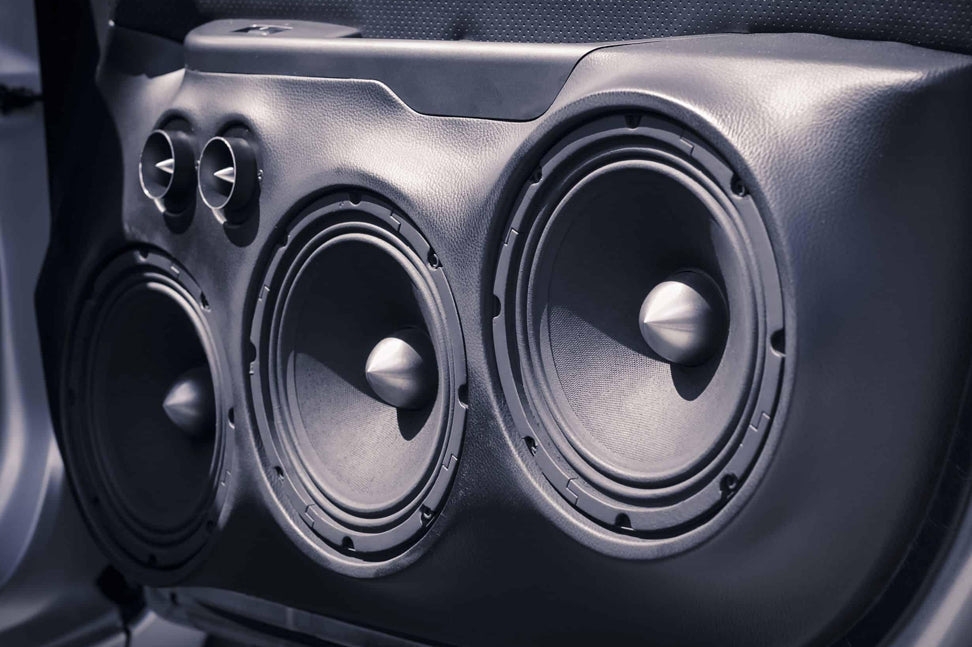Are you tired of that annoying static noise coming from your car speakers? You’re not alone.
That irritating crackle can ruin your favorite tunes and turn your peaceful drive into a frustrating experience. But here’s the good news: fixing car speaker static is easier than you might think. In this guide, we’ll walk you through simple steps to identify the problem and restore crisp, clear sound to your car’s audio system.
Whether you’re a car audio novice or a seasoned pro, you’ll find practical solutions to tackle that static head-on. Keep reading to discover how you can enjoy your music without the unwanted noise!
:max_bytes(150000):strip_icc()/curing-car-audio-static-534627-6faef7e1970045bda6852f1a05f4eab9.png)
Credit: www.lifewire.com
Causes Of Car Speaker Static
Car speaker static can ruin your listening experience. Understanding the causes helps in finding a solution. There are multiple reasons for car speaker static. Knowing them can save time and money.
Interference And Electrical Noise
Electrical noise often disrupts audio quality. Nearby devices may interfere with car speakers. Cell phones, GPS, or other electronics can cause static. Ensure these devices are away from the audio system. Check for any loose connections in the electrical system. They can be a source of noise.
Faulty Wiring Connections
Faulty wiring is a common issue. Loose or broken wires lead to static sounds. Inspect the wiring for damage or wear. Tighten any loose connections. Replace broken wires promptly. Secure connections reduce the chance of static. Proper wiring ensures clean sound.
Damaged Speakers Or Components
Speakers themselves can be problematic. Damage to speakers causes distortion. Look for visible damage or wear on speaker surfaces. Check speaker components like coils and magnets. If damaged, consider replacing them. Regular maintenance keeps speakers in good shape.
Diagnosing The Problem
Diagnosing the problem of car speaker static can be a bit of a puzzle, but it’s crucial for restoring your audio experience. Static can arise from various sources, and pinpointing the issue is your first step to a clearer sound. Before you dive into buying new equipment, take a moment to understand where the noise is coming from. You might find that a simple adjustment or repair is all you need.
Listening For Specific Sounds
Start by listening carefully to the static. Is it a consistent crackling, or does it change with speed or turning? Different sounds can indicate different issues. A persistent hiss might be linked to a ground loop problem. Sudden bursts of noise could suggest interference from nearby electronics. By identifying the type of static, you narrow down potential causes.
Inspecting Speaker Connections
Check the connections of your speakers. Loose wires or corroded terminals often lead to static. Inspect each connection point; sometimes, a simple tightening or cleaning can make a world of difference. It’s worth considering any recent changes you’ve made to your car’s interior, as these might have disrupted the wiring.
Testing Audio Sources
Test different audio sources such as the radio, CD player, or Bluetooth. If static is present across all sources, the issue might be with the speakers themselves. However, if the static is specific to one source, you might need to adjust settings or replace a faulty cable. This process helps in isolating the problem and making informed decisions.
Have you ever thought about how a minor electrical issue can affect your daily commute? A small fix can transform your drive from a frustrating experience to a relaxing one. By diagnosing the problem correctly, you not only save money but also enhance your understanding of your vehicle. Remember, the goal is to enjoy the music, not battle with static. So, why wait? Start diagnosing and reclaim your sound!
Tools And Materials Required
Car speaker static can be annoying. Fixing it requires the right tools. With the proper materials, you can improve sound quality. Here’s what you need to gather before starting.
Essential Tools
A screwdriver set is crucial. It helps in removing speaker panels. Needle-nose pliers are useful for gripping small wires. A multimeter is important for checking electrical connections. It ensures that power flows correctly. Wire cutters might be needed. They are handy for trimming excess wires.
Recommended Materials
Electrical tape is vital for securing connections. It prevents shorts and keeps wires in place. Speaker wire is essential if you need to replace damaged wires. It’s wise to have extra on hand. A contact cleaner is useful. It cleans dirty or corroded connectors. Ensuring clean connections can reduce static.
Checking And Fixing Wiring
Car speaker static can be annoying and frustrating. Fixing the wiring can often resolve these issues. Poor connections or damaged wires are common causes. Properly addressing these can improve sound quality significantly.
Inspecting Connection Points
First, turn off the car. Safety is important. Then, examine the speaker connections. Look for loose or corroded terminals. Dust and corrosion can disrupt sound quality. Clean the terminals with a soft cloth. Ensure each connection is secure.
Replacing Damaged Wires
Check the wiring for visible damage. Frayed or broken wires can cause static. Use a wire stripper to remove damaged sections. Replace these with new wires. Ensure the new wires match the original gauge. This maintains the sound quality.
Securing Loose Connections
Loose connections can also cause static. Ensure all connections are tight. Use pliers to gently tighten any loose fittings. Avoid overtightening, as this can damage the connections. Properly secure wires with cable ties. This prevents future issues.
Removing Electrical Interference
Fixing car speaker static involves removing electrical interference. Start by checking all connections for tightness. Next, ensure wires are not near power sources. Finally, install a noise filter to block unwanted signals.
Removing electrical interference is crucial for fixing car speaker static. Interference can disrupt your audio experience. The good news? You can fix it with a few steps. Let’s explore how to remove this interference and enjoy clear sound. ###Identifying Sources Of Interference
Start by identifying interference sources. Common culprits include your car’s alternator and ignition system. Mobile devices and other electronic gadgets can also cause static. Turn off these devices to see if the static stops. Check if the static changes with engine speed. This can indicate alternator issues. ###Installing Noise Filters
Installing noise filters can help reduce interference. These filters are easy to install and affordable. Connect the filter to the power line of the car stereo. This helps block unwanted electrical noise. Choose a high-quality filter for better results. Follow the instructions carefully during installation. ###Improving Ground Connections
Poor ground connections can cause static in car speakers. Ensure all connections are tight and secure. Inspect the ground wire connected to the car stereo. It should be free from rust and corrosion. Clean the connections to improve sound quality. A solid ground connection reduces static significantly.
Credit: eliteautogear.com
Repairing Or Replacing Speakers
Car speaker static can ruin your driving experience, transforming sweet melodies into a cacophony of crackles and pops. Sometimes, the solution lies in repairing or replacing the speakers themselves. Whether you’re a seasoned DIY enthusiast or a curious newbie, fixing your car speakers doesn’t have to be daunting. Let’s dive into the heart of the issue and explore how you can restore your car audio to its former glory.
Assessing Speaker Damage
Start by checking the speakers for visible damage. Look for tears in the cone or signs of wear. Gently press the speaker cone to feel for unusual stiffness or rattling.
If possible, test the speakers individually. Connect them to another audio source to see if the static persists. This helps pinpoint whether the issue is with the speaker or the wiring.
Listen closely for any distortion or buzzing sounds. Sometimes, the damage isn’t visible but can be detected through sound anomalies.
Repair Techniques
Simple repairs can often save you from buying new speakers. Use glue or tape to mend small tears in the speaker cone. Ensure it’s flexible enough not to impede the sound.
If static is due to loose connections, tighten the connections and ensure wires are properly shielded. This could resolve interference causing the static.
For stubborn issues, consider replacing the speaker diaphragm or voice coil. These repairs require more expertise but can restore sound quality dramatically.
Choosing Replacement Speakers
When replacing speakers, prioritize compatibility. Ensure the new speakers match your car’s audio system specifications for optimal performance.
Consider speaker size and type. Coaxial speakers are versatile and user-friendly, while component speakers offer superior sound for audiophiles.
Don’t just go for the cheapest option. Balance cost with quality to find speakers that deliver crisp sound without breaking the bank.
Have you ever wondered why some speakers last longer than others? It often boils down to how well they are maintained and the quality of materials used. You might want to invest in speakers with durable materials to avoid frequent replacements. Repairing or replacing your car speakers might seem challenging, but with the right approach, you can easily bring back the joy of music on the road. Remember, a little attention to detail can go a long way in enhancing your audio experience.
Preventative Measures
Car speaker static can disrupt your driving experience. To avoid this issue, it’s crucial to take preventative measures. Regular maintenance and protective actions can help keep your speakers clear and crisp. This section explores effective strategies to prevent static from affecting your car audio system.
Regular Maintenance Tips
Check your speaker wires for loose connections. Secure any loose wires to ensure clear sound. Inspect your car’s audio system regularly for dust buildup. Dust can interfere with sound quality. Clean the speaker grills gently to remove any obstructions. Use a soft brush or cloth. Keep your car’s battery connections tight. Loose connections can lead to static noise.
Protective Measures Against Future Issues
Avoid placing heavy objects on top of speakers. This can cause damage and distortion. Install rubber mats under speakers to absorb vibrations. Vibrations can lead to static interference. Use quality cables and connectors in your audio system. Cheap cables may deteriorate over time. Store your car in a dry place to prevent moisture damage. Moisture can impact electrical components.

Credit: www.youtube.com
Frequently Asked Questions
How Do I Get Rid Of Static Noise In My Car Speakers?
Check for loose connections and secure them. Install a noise filter. Replace faulty wires. Ensure proper grounding. Disconnect auxiliary devices to identify interference.
How To Fix A Static Speaker?
First, turn off the speaker and unplug it. Check and clean connections and cables. Inspect for physical damage. Test with different devices and audio sources. Replace faulty components if needed. Seek professional repair if the issue persists.
How To Fix Car Speaker Crackling Sound?
Check speaker connections and wiring for damage or loose ends. Adjust balance and fade settings. Replace faulty speakers or amplifier components. Inspect for interference from nearby devices. Ensure clean audio signal from the audio source.
How To Fix Bluetooth Static In Car?
Ensure Bluetooth device and car audio system are updated. Reduce interference by turning off nearby devices. Adjust car audio settings and check Bluetooth connections. Reset Bluetooth pairing on both devices. Clean audio ports and wires for better connectivity. Seek professional help if problems persist.
Conclusion
Car speaker static can be annoying during drives. Fixing it is simple. Regularly check connections and wires. Clean them for better sound. Replace damaged parts promptly. Adjust settings on your audio system. This can reduce interference. Invest in quality speakers if needed.
They often provide clearer sound. Remember, maintenance is key. Keeping your car audio in good shape ensures a pleasant journey. Enjoy your favorite tunes without interruption. With these tips, you can eliminate static. Drive with clear sound and peace of mind.
Safe travels!
